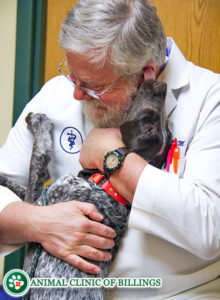Heartworm, Fleas, & Ticks
At the Animal Clinic of Billings and Animal Surgery Clinic, our veterinarians and support staff love helping to educate our clients about parasite detection and prevention methods in dogs. We take great pride in providing our canine patients in and around the Billings area with the best treatment protocols and highest standard of veterinary care to keep our patients as happy, healthy, and parasite free as they possibly can be.
Heartworms
Heartworms live in the heart and large pulmonary arteries of infected dogs. A mosquito carrying heartworm larvae (picked up from feeding on an infected dog) transmits them to a dog through its bite. The transmitted heartworm larvae then take 6 full months to migrate throughout the dog’s body before finally anchoring themselves in the heart.
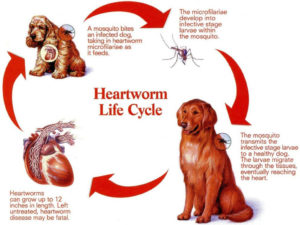
Adult heartworms cause a partial obstruction of the flow of blood through the heart, which over time results in severely compromised heart and lung function. Heartworms are treatable if detected before they are able to cause irreversible damage to the heart and lungs. However, there is no treatment for dogs with advanced stages of heartworm, and the condition is fatal.
Heartworms are easily preventable by giving a dog a chewable heartworm medication once a month for each month mosquitoes are present in their area. Heartworm testing and medication is a routine component of preventive veterinary care, and your veterinarian will inform you of when to test for heartworms and which heartworm preventatives are best for your dog.
Heartworms are parasites transmitted by mosquitos that inhabit a dog’s (or rarely, a cat’s) heart. Over time, as they grow and interfere with heart function, they cause heart and lung disease, which will ultimately be fatal if not treated.
In Montana, the mosquito population can vary quite a bit depending on the temperature and the amount of moisture we receive, but mosquitoes are typically present from about April through October or early November.
Other Common Worms Found in Dogs and Cats
Roundworms
the most commonly encountered intestinal worm in dogs and cats, can grow up to 3-5” long, and resemble a strand of cooked angel hair pasta. Roundworms reside in the intestinal tract and shed their eggs in the pet’s stool. Adult worms are only occasionally passed in an infected pet’s stool, so an absence of visible worms does not necessarily indicate that a pet is not infected. Roundworms can be transmitted while nursing from an infected mother, or via contact with an environment where an infected animal has previously defecated. Eggs are able to survive and remain infective for years in the environment. It is important for all pet owners to be aware that roundworms can be transmitted to humans, in whom they can cause potentially life-threatening damage as they migrate through internal organs. Most human infections occur in babies and children who inadvertently ingest eggs from a contaminated environment.
Roundworms are the most commonly encountered intestinal worm in dogs. Roundworms can grow up to 3-5” long, and resemble a strand of cooked spaghetti. Roundworms burrow themselves into the intestinal tract of a dog and their eggs are shed in the dog’s stool.
Roundworms can be transmitted to dogs while nursing from an infected mother, or if a dog comes into contact with another infected animal’s fecal matter in the environment. Eggs are able to survive and remain infective for extended periods of time in the environment.
If your dog has roundworms that have had enough time to grow into adulthood, dead worms may be visible in your dog’s feces. If you notice worms of any kind in your dog’s feces, schedule an appointment with your veterinarian as soon as possible.
Because it is possible for a dog to be infected with roundworms even if no adult worms are visible in their stool, a veterinarian will typically perform a microscopic fecal exam to check for the presence of eggs, a more definitive way to diagnose an infection with this parasite.
If diagnostic testing reveals the presence of roundworms in your dog, your veterinarian will prescribe one of several effective medications to eliminate the infection.
It is important for all pet owners to be aware that roundworms can be transmitted to humans, in whom they can cause potentially life-threatening damage as they migrate through internal organs. Most human infections occur in babies and children who inadvertently ingest eggs from a contaminated environment.
Tapeworms
can grow to lengths of eight inches and have a long and flat ⅛” segmented body. Dogs and cats commonly contract tapeworms by ingesting a host such as a flea, rodent, or other mammal carrying tapeworm eggs. Tapeworms attach themselves to the wall of an animal’s small intestine with a sharp, hook-like mouth and rob them of important nutrients. Infected animals often have tiny tapeworm segments, resembling small grains of rice, in their stool and in the fur around their anus.
Tapeworms can grow to lengths of eight inches and have a long and flat ⅛” segmented body. Dogs commonly contract tapeworms by ingesting a host carrying tapeworm eggs, like a flea or other insect. Tapeworms attach themselves to the inside wall of a dog’s small intestine with a sharp, hook-like mouth. Outdoor dogs have a greater risk of contracting tapeworms than inside dogs as contact with infected bugs or insect larvae such as fleas is the means of transmission.
Typically tapeworms are contracted via ingestion of eggs deposited on the skin by a flea as a dog engages in grooming behavior, or through direct ingestion of a flea while grooming.
Tapeworms rob dogs of critical vitamins, minerals, and nutrients by feeding on the partially digested foods that are being broken down in the dog’s intestines. This is why it is extremely important to initiate an appropriate tapeworm treatment protocol immediately if you notice the presence of tapeworm segments, resembling small grains of rice, either in your dog’s stool or on the skin and fur around the anus.
If you notice any of these indicators, please contact your veterinarian immediately. We have extremely effective tapeworm treatments for dogs, but as with every medical condition, early detection and intervention go hand-in-hand with a better prognosis for a full recovery.
Hookworms
measuring less than 1 inch in length, attach to the intestinal wall, where they feed on the host’s blood. A pet can become infected through ingestion of microscopic larvae from infected prey, a contaminated environment, or from their mother’s milk. Larvae are also able to burrow directly through the skin and migrate to the intestine. Hookworms can cause life-threatening anemia in pets of all ages, but are especially dangerous in puppies, kittens, and individuals with chronic health conditions. Hookworm eggs are passed in the host’s feces, where they can spread to infect other animals and people. It is important for all pet owners to be aware that hookworms can be transmitted to humans, in whom they can cause a very itchy and uncomfortable skin infection. While generally not life-threatening in humans, hookworms can cause significant distress and discomfort.
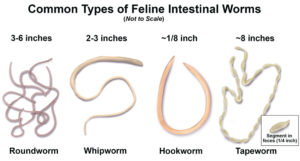
Hookworms, measuring less than 1 inch in length, are primarily found in the small intestines of infected canines, where they feed on the host’s blood. A dog can become infected through ingestion of microscopic larvae from a contaminated environment or from their mother’s milk.
These larvae are also able to burrow directly through the skin and migrate to the intestine. Hookworms can cause life-threatening anemia in dogs of all ages, but are especially dangerous in puppies and dogs with chronic health conditions.
Hookworm eggs are passed in the host dog’s feces, where they can spread to infect other animals and people as well. Hookworms are diagnosed by detecting eggs on a microscopic fecal exam. Several medications are effective in eliminating a hookworm infection.
It is important for all pet owners to be aware that hookworms can be transmitted to humans, in whom they can cause a very itchy and uncomfortable skin infection. While generally not life-threatening in humans, hookworms can cause significant distress and discomfort.
Whipworms
are very tiny—usually under ¼ inch long—and inhabit an animal’s colon, where they cause inflammation that may result in bloody diarrhea, anemia, and weight loss. Whipworms are transmitted via ingestion of eggs from a contaminated environment. Whipworms have the potential to cause serious blood loss, especially in puppies and dogs with chronic health conditions.
Whipworms are transmitted via ingestion of eggs from a contaminated environment. Adult whipworms reside in a dog’s colon, where they cause inflammation which may result in bloody diarrhea, anemia, and weight loss.
Because adults can’t grow much longer than a fourth of an inch, this parasite is usually not visible in an infected dog’s stool, so it must be diagnosed with a microscopic fecal exam by your vet. Whipworms have the potential to cause serious blood loss, especially in puppies and dogs with chronic health conditions. Several medications are effective in eliminating whipworm infections.
Ringworm
Ringworm is a common skin disease found in dogs, humans, and many other animals. It’s caused by the growth of a fungus on the outer layer of the host’s skin that results in circular lesions and sores that form a ring shape. Ringworm infection doesn’t involve a worm at all, but rather it’s a fungal infection of the skin. Properly treating ringworm takes time, but the condition is curable.
How worms are contracted in dogs
Almost every dog is at risk of contracting worms at various points throughout their lives due to their high level of outdoor exposure, social behaviors, and natural curiosity to investigate everything they come across.
Common ways a dog can contract parasites or worms include:
- Ingestion of the mother’s milk when nursing as a puppy
- Via mosquito, flea, and tick bites
- Ingestion of infected rodents, birds, reptiles and insects, or remnants of dead ones
- Contact with contaminated feces or vomit
- Contact with another dog or infected animal
- Contact with a contaminated environment (including most outdoor areas)
Very severe medical problems can result from a dog contracting worms if the parasites are left untreated. Because of this, we recommend discussing worm prevention with one of our veterinarians and implementing a deworming protocol for your dog. During your de-worming consultation, one of our veterinarians will discuss what symptoms to watch for that may indicate a worm infection in your dog.
How can I tell if my dog has worms?
Staying on top of preventive health care protocols and regular bi-annual wellness examinations with your veterinarian are integral to keeping your dog healthy and parasite free. Generally, by the time your dog is displaying symptoms of a worm infestation, the parasitic problem has been present and growing for quite some time already.
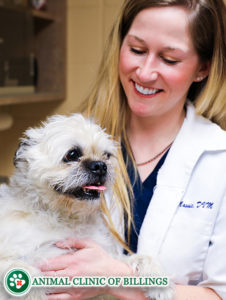 Some of the most common symptoms your dog might display if worms are present include:
Some of the most common symptoms your dog might display if worms are present include:
- Vomiting
- Weight loss
- Increase or decrease in appetite
- Pot-belly or protruding abdomen
- Chronic coughing
- Lethargy
- Diarrhea
- Hair loss, dry dull haircoat
- Itchy skin
- Anal rubbing or dragging across the floor
The symptoms listed above, however, can also indicate other illnesses in dogs so please call your veterinarian to schedule an appointment ASAP if your dog is showing any of these symptoms or behaviors.
How can I tell if my dog has heartworms?
When heartworms are present in a dog, symptoms gradually develop with progression through the four stages of disease.
Stage 1
The first stage of heartworm disease in dogs typically has no indicating signs or symptoms at all. During the first stage, heartworms are just beginning to establish themselves within the dog’s heart and have not begun to reproduce.
Stage 2
The second stage of heartworm disease in dogs will cause symptoms of exercise intolerance and a mild chronic cough to develop. At this point, the heartworms have established themselves in the heart long enough for the reproduction and antibody production to take place, and infection can now be detected with a blood test.
Stage 3
By the third stage of a dog’s heartworm disease, the symptoms are very noticeable and impact your dog’s health tremendously. Coughing (sometimes with blood), difficulty breathing, and reluctance to exercise all develop. By stage three, the damage to the heart caused by the heartworms will be visible on X-rays.
Stage 4
By stage four, an infected dog will be very ill and present all of the same symptoms of stage 3, only more intense. Even with heartworm treatment, this stage of the disease carries a poor prognosis.
Additional heartworm disease symptoms in dogs can include:
- Rapid Heart Beat
- Fainting
- Anemia
- Heart Failure
- High Blood Pressure
How are worms treated in dogs?
Generally, treating worms in dogs has an excellent prognosis, as long as dogs receive treatment before the worms are allowed to progress into the advanced stages of infestation. If your dog is found to have a parasite, your veterinarian will prescribe an appropriate deworming medication, depending on the type of parasite, the extent of the infestation, and other medical considerations specific to your dog’s individual needs.
Please Note: It is extremely important that you do not try to address any worm-related problems in your dog with over-the-counter medications without consulting your veterinarian first. The type and severity of the infestation and medical management strategy can only be determined by a veterinarian. If your dog has worms or shows other concerning signs of illness, please call the Animal Clinic of Billings and Animal Surgery Clinic today to schedule a consultation with our veterinarians.
Are worms in dogs a danger to myself or my family?
Yes. Some worms can certainly pose a threat to humans if contracted from the family dog. Roundworms, for example, are extremely dangerous to people, especially children who play in outside areas that are likely frequented by potential host animals such as dogs, cats, and raccoons.
In the U.S., 10,000 children are infected with worms each year, and the most severe cases can result in blindness. This is one reason why implementing an effective worm prevention protocol with your veterinarian is so important.
Parasite Prevention and De-worming for dogs and puppies
Puppies
Puppies will need their first deworming at three weeks of age and then as directed by your veterinarian. Monthly heartworm preventive medications are recommended which also helps prevent some types of intestinal parasites. This should serve as the starting point for your dog’s annual deworming protocol.
Adult Dogs
After puppies have been properly dewormed, adult dogs should receive monthly preventives year round. Additionally, we recommend performing fecal tests between 2-4 times per year.
Newly Acquired Dogs
If you have newly acquired or adopted a new dog, they should be dewormed by your veterinarian immediately. No matter what your new dog’s age or documented history, an initial microscopic fecal exam and deworming should be performed, followed by monthly preventive deworming medication.
Internal Parasites in Pets
Almost every dog and cat is at risk of contracting worms at various points throughout their lives due to their high level of outdoor exposure, social behaviors, and natural curiosity to investigate everything they come across. At the Animal Clinic of Billings, our veterinarians and support staff love helping to educate our clients about parasite detection and prevention methods in dogs and cats. We take great pride in providing our patients with the best prevention and treatment protocols and highest standard of veterinary care to keep our patients as happy, healthy, and parasite free as possible.
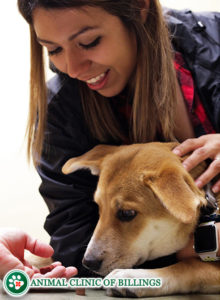
Generally, treating worms in dogs and cats has an excellent prognosis, as long as the animal receives treatment before the worms are allowed to progress into the advanced stages of infestation. If your dog or cat is found to have a parasite, your veterinarian will prescribe an appropriate deworming medication, depending on the type of parasite, the extent of the infestation, and other medical considerations specific to your dog or cat’s individual needs.
In order to definitively diagnose an infection with an intestinal parasite, a microscopic fecal exam must be performed to identify parasite eggs. The absence of visible worms in a pet’s stool is not an indication that they are free of parasites. If an intestinal parasite is detected in a stool sample, a medication effective against that parasite will be prescribed to clear the infection.
Due to the risk of transmission from their mother, all puppies and kittens should be dewormed several times within their first eight weeks of life. Additionally, because the risk of intestinal parasite infection is so high in animals that go outdoors, it is recommended that all dogs and cats that spend any time outside be given a broad-spectrum deworming medication once per month, and have their stool tested at least once yearly.
Heartworm Infections in Dogs and Cats
Heartworms primarily live in the heart and large pulmonary arteries of infected dogs, although cats can also occasionally be infected. A mosquito carrying heartworm larvae (picked up from feeding on an infected dog) transmits them to another dog through its bite. The transmitted heartworm larvae then take six months to migrate throughout the dog’s body before finally anchoring themselves in the heart. Adult heartworms cause a partial obstruction of the flow of blood through the heart, which over time results in severely compromised heart and lung function. Heartworms are treatable if detected before they cause irreversible damage to the heart and lungs. However, there is no cure for pets in heart failure due to advanced disease, and the condition is ultimately fatal.
Heartworm Prevention
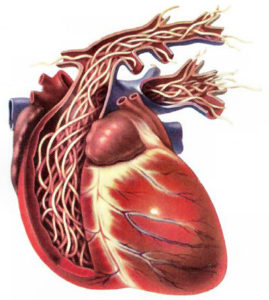
Heartworms can easily be prevented in dogs with medication that comes in the form of a monthly chewable tablet. We carry monthly Interceptor Plus and recommend that all dogs receive it year-round. The chew should be given once every thirty days to ensure your dog is adequately protected from heartworms. This medication also has the benefit of preventing the most common types of intestinal parasites.
Heartworms can easily be prevented with medication that comes in the form of a monthly chewable tablet or topical medication that kills immature worms in the bloodstream before they mature and become resistant to the medication. We carry monthly Interceptor Plus and Revolution for the prevention of heartworm, and recommend that all dogs and all outdoor cats receive a preventative year-round. These medications also have the benefit of removing the most common types of intestinal parasites.
While many people in colder climates only treat during the warmer months, the American Heartworm Society recommends all pets be treated year round, in order to reduce the risk of early or late-season transmission. They also recommend annual testing (in-house blood test), so if a lapse in coverage did occur, treatment can be started before the heart and lungs get damaged.
Since 1981 the Animal Clinic of Billings has made heartworm prevention an integral component of our preventive care protocol. If a dog or cat is infected with heartworms, their presence will lead to cardiac and pulmonary disease that is ultimately fatal. Therefore, heartworm prevention is crucial. At the Animal Clinic of Billings and Animal Surgery Clinic, our team of veterinarians and veterinary technicians are here to do everything we can to help protect your dog or cat from this terrible disease.
Since 1981 the Animal Clinic of Billings has made heartworm prevention an integral component of our preventive care protocol for dogs. If a dog is infected with heartworms, their presence will lead to serious cardiac and pulmonary disease that is ultimately fatal. Therefore, heartworm prevention is very important. At the Animal Clinic of Billings and Animal Surgery Clinic, our team of veterinarians and veterinary technicians are here to do everything we can to help protect your dog from this terrible disease.
How are heartworms treated in dogs?
There is an effective treatment for heartworms in dogs, but it does have risks, and the damage that has already taken place cannot be undone. Therefore, it is MUCH better to prevent disease than to treat. Monthly preventatives are very effective in preventing any microscopic heartworm larvae introduced by a mosquito bite from surviving long enough to infect the heart.
While many people in colder climates only treat during the warmer months, the American Heartworm Society recommends all pets be treated year round, in order to reduce the risk of early or late-season transmission. They also recommend annual testing (in-house blood test), so if a lapse in coverage did occur, treatment can be started before the heart and lungs get damaged.
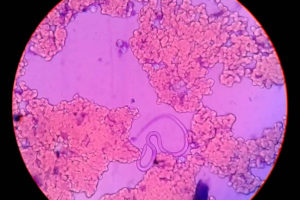
A blood test must be performed on your dog to diagnose the presence of heartworms and begin a treatment protocol. If the blood test is positive for heartworms, additional testing such as a confirmatory
antigen test, a urinalysis, and chest X-rays, will then be needed to determine the severity and stage of the heartworm disease in order to properly treat it. Additionally, an ultrasound of the heart may be required for our doctors to determine the extent of any damage that has occurred within the internal structures and surrounding vessels of the heart.
If our doctors determine a dog’s heartworm disease is treatable, the patient will likely need to be hospitalized and given a medication specifically designed to kill heartworms known as an adulticide. Several treatments will be administered over a period of several months to kill the adult worms. The treatment itself has a risk of causing serious complications, but measures are taken to minimize these.
In some extreme cases, surgical removal of adult heartworms from the inner veins and arteries of the heart may be needed, but this is very rare.
Can cats get heartworms?
While it is possible for a cat to get heartworm, it is very rare, and preventatives are often only given to cats in areas where heartworm is extremely common (southern States). Effective monthly heartworm preventatives also exist for cats; the one we carry is Revolution, which is a topical medication that also kills fleas, ear mites, roundworms, and hookworms.
What to do if you think your pet has worms
 Our dedicated veterinary team is here to provide treatment options and help answer any worms questions you might have.
Our dedicated veterinary team is here to provide treatment options and help answer any worms questions you might have.
If you suspect your dog has worms, please call to schedule a veterinary appointment for your canine friend with us today.
406-252-9499 REQUEST AN APPOINTMENT


